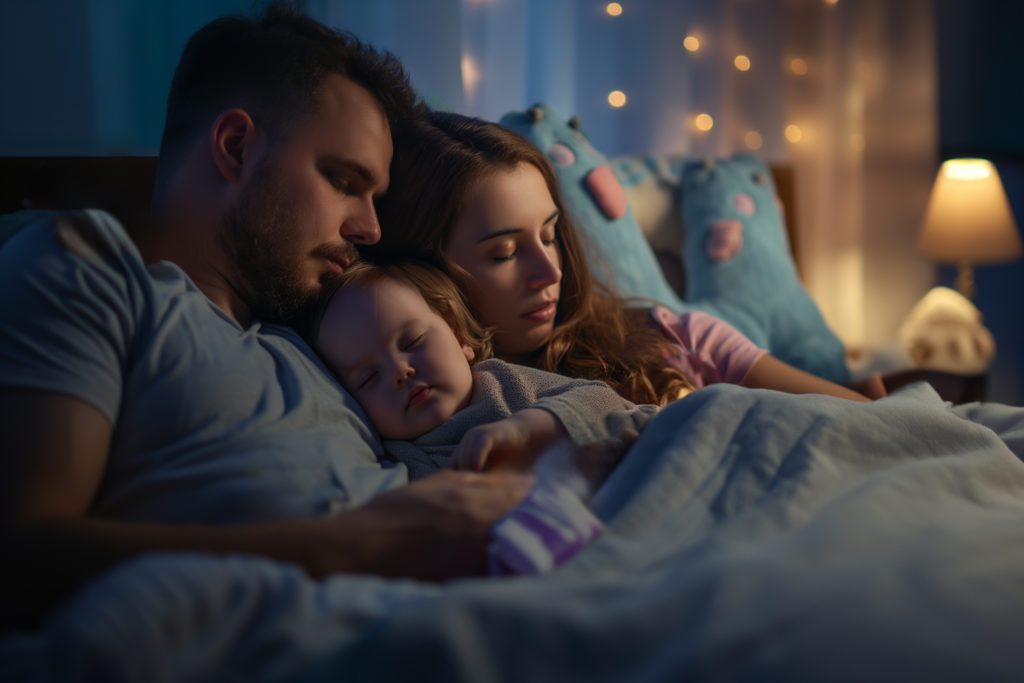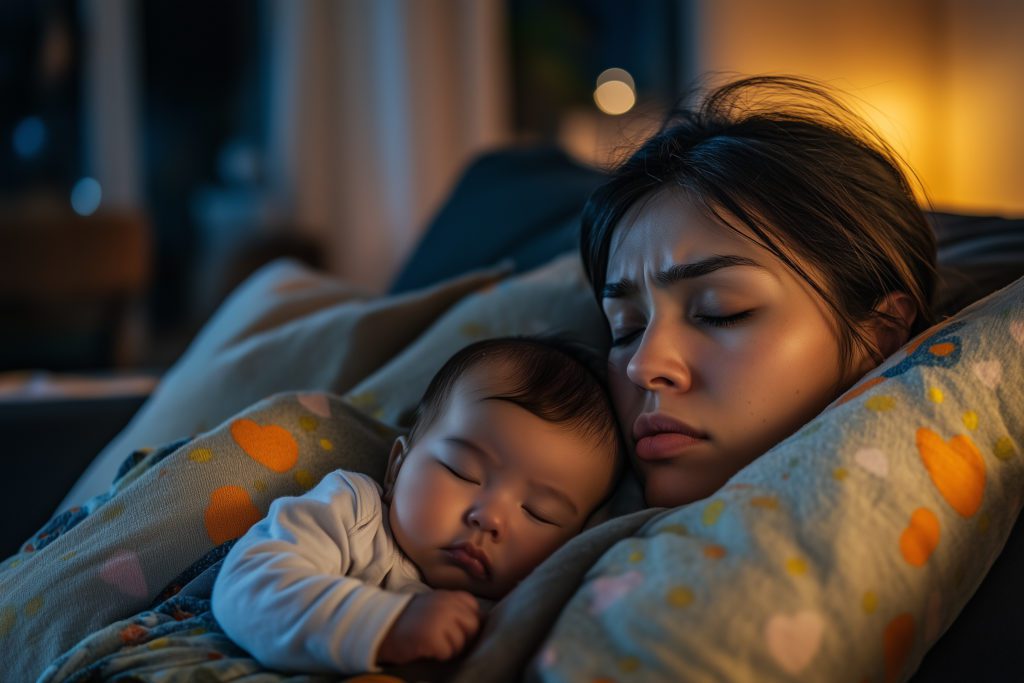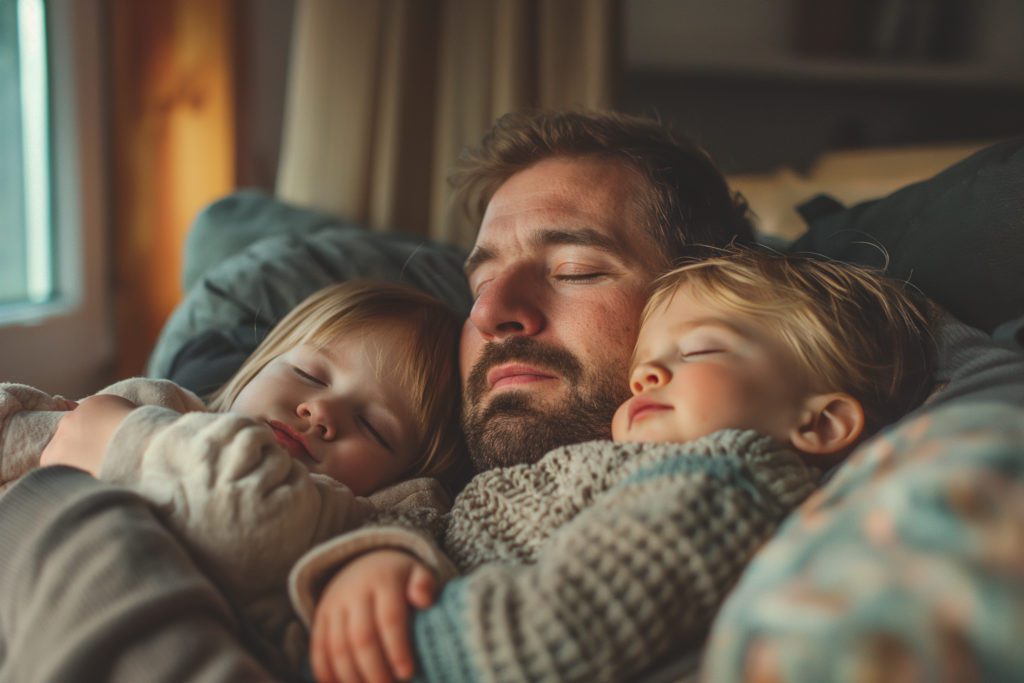
Sleep Talking in Children vs. Adults: Differences, Causes, and Concerns
Have you been caught talking in your sleep? Read more to learn about sleep talking in both children and adults and how it impacts their lives.

One of the most common parasomnias in the world, sleep talking—also known as somniloquy—can occur in both children and adults. Even though it is so common, people rarely understand how this happens, why it happens, and some of the differences that may exist between these two populations. Is it the same for both children and adults or are there specific causes that can trigger sleep talking for both kids and adults?
In this article, we’re going to explore sleep talking in both children and adults, including the differences between these two populations, the causes, and the concerns of sleep talking per group. Whether you sleep-talk yourself or know someone who does, you’ll become an expert on this topic and understand more about how it impacts people of all ages. Let’s first explore why children sleep-talk, as well as what causes it and the primary concerns for this age group.
Understanding Sleep Talking in Children
It’s true that about 50% of children today experience a sleeping problem, with many of these conditions arising sometimes before they enter school. Some studies have even shown that half of kids between the ages of 3 and 10 converse in their sleep without even realizing it, with girls being more affected than boys.
Sleep talking usually occurs during slow wave period but can happen at any stage of sleep, and children will usually not remember what they said. However, what causes this in children? According to studies, it might also be similar to what occurs in adults.
Causes of Sleep Talking in Children
For children, there are several causes that can explain why sleep talking occurs at all. According to a pediatric expert, sleep talking in children usually happens because of sleep deprivation, mental health concerns, or even fever or illness. In some cases, if a parent sleep talks, so, too, will the child be more likely to also develop this condition. Additionally, children may be more likely to talk in their sleep if they experience sleepwalking and night terrors.
However, there are still so many studies being done, and there’s no conclusive answer as to what causes sleep talking to occur. Another unknown for many people is whether sleep talking actually affects people’s sleep or whether it is a negligible experience for kids. Fortunately, we have found support to suggest that sleep talking is not as harmful as other parasomnias.
How Sleep Talking Impacts Children’s Sleep
Fortunately, you’ll be pleased to know that your child’s sleep talking is not as harmful as you might think. Sleep talking is not a permanent issue either; many experts have noted that it usually disappears by the time they are teenagers (Source: Children’s Health). This is excellent news for parents worried about their toddlers and elementary-aged children speaking while they are resting!
However, if you feel that your kid is engaging in too much sleep talking as well as other uncommon behaviors while sleeping, it is always a good idea to consult with a medical professional. Parasomnias might occur together, so if you have any concerns, it’s best to talk to a professional who can give you guidance and help you ensure your child is getting the best rest.
Now that you understand more about this parasomnia and how it impacts kids, what about adults? It’s time to see what differences may exist between adults and children who experience sleep talking while they rest.
What About Sleep Talking in Adults?
One of the first differences between children and adults who sleep talk is the prevalence of this condition. Sleep talking only occurs in about 5% of adults. Much like children who sleep talk, adults who experience this while they rest will also engage in it during a slow wave period, but it can occur in all sleep stages.
Not only that but adults and children are also not likely to remember what they say while they sleep. Similarly, the act of sleep talking only occurs in short conversations as well, usually no more than a few lines of speech. However, some of the causes might be different in adults due to their stage of development and even the type of conditions that they might also be experiencing at the same time.
Causes of Sleep Talking in Adults
Much like kids, adults who sleep talk may also do so out of stress, illness, but there are also ties to other sleep conditions as well. Sleep talking can be related to REM behavior disorder, sleep-related eating disorders, or even sleepwalking. However, it can also be tied to other sleep conditions like sleep apnea and night terrors, similar to the causes of sleep talking in children.
As you can tell, sleep talking can be connected to many other concerns or pre-existing issues that adults face, even medication use. Fortunately, just like with kids, sleep talking is not usually a harmful parasomnia as compared to other sleep disorders and behaviors.
How Sleep Talking Impacts Adults
As we discussed with kids who sleep talk, adults who experience this while they sleep also do not experience any negative impacts (Source: PubMed). Even though sleep talking can occur with other sleep conditions, sleep talking itself is generally benign in its impact. However, that doesn’t mean you should avoid getting help if you are concerned about your sleep talking.
If your partner or family notices you sleep talking a lot, it is always a good idea to seek support from medical professionals. This is especially helpful if you experience symptoms of other sleep disorders, as they can guide you to find the best treatment and support so you can get adequate rest.
Manage Your Sleep Health and Enjoy Restful Nights
Now that you know a little bit more about sleep talking, it’s essential to take care of your rest. If you feel concerned about the frequency of your parasomnia, don’t be afraid to speak to a medical professional about your situation. Above all else, if you want to encourage better rest while you sleep, focus on improving your sleep hygiene and reducing your stress. For more insights into proper sleep health and how you can promote more restful nights, visit our website today.
FAQ
Should you wake someone up if they are sleep talking?
Not necessarily. Sleep talking is typically harmless, and waking someone up may only confuse or startle them. However, if they seem distressed or experiencing a night terror, gently soothing them without waking them fully may be more helpful.
Can sleep talking be influenced by what you watch or read before bed?
Yes! Watching intense movies, engaging in deep conversations, or even reading an emotional book before bed can stimulate your brain and increase the likelihood of sleep talking. If you or your child frequently sleep talk, consider winding down with something calming before bedtime.
Can sleep talking reveal secrets or hidden thoughts?
Not really. Sleep talking is usually a mix of fragmented thoughts, dreams, or random brain activity. While it might sound like someone is confessing something, their words often don’t have any real meaning or connection to their conscious thoughts.
Are certain personality types more likely to sleep talk?
There’s no solid evidence linking personality traits to sleep talking, but some studies suggest that people who are highly imaginative, expressive, or stressed may experience more frequent episodes. Extroverts and people with active dream recall might also be more prone to sleep talking.
Can sleep talking be triggered by dreams?
Yes! Sleep talking can sometimes be connected to dream content, especially if the person is in REM sleep. However, most of what they say won’t make sense or directly reflect their dreams—it’s usually random and fragmented.
Can sleep talking happen during naps?
It’s possible, though much less common. Since naps usually involve lighter sleep stages, deep sleep parasomnias like sleep talking are less likely to occur. However, if someone is sleep-deprived, they may sleep talk even during a short nap.

Written by
Marie Soukup
Marie Soukup is a seasoned copywriter, editor, and Integrative Nutrition Health Coach with a certificate from the Institute of Integrative Nutrition (IIN). With years of experience working with brands across diverse industries, Marie is passionate about holistic health and crafting compelling content.
Download Pillow
Get help
Press & News
Legal
Connect
X (Twitter)
Company
Copyright © Neybox Digital Ltd.



